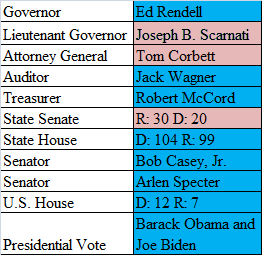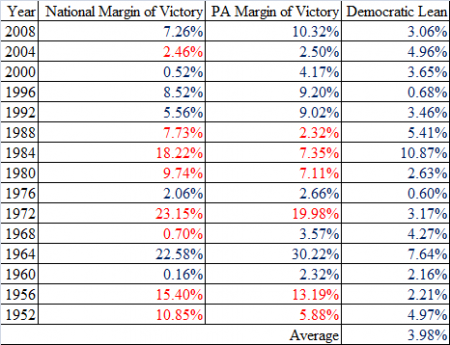This is the first part of an analysis of the swing state Pennsylvania. Part two can be found here.
In the dying days of his campaign John McCain mounted a quixotic attempt to win Pennsylvania. Despite his efforts, Obama cruised to a double-digit victory; from May to November 4th, only one poll showed McCain leading.
Two years previously, Pennsylvania Senator Rick Santorum – a Republican politician who had ambitions of becoming president – ran for re-election. A hard-line, nationally known conservative, he was overwhelmingly defeated by challenger Robert Casey.
These two instances provide a sense of Pennsylvania’s political climate; the state, while not exactly liberal, naturally leans towards Democratic candidates. The average Republican must overcome a formidable Democratic machine to win Pennsylvania.
Continued below the fold.
There used to be a time when the opposite was the case; Republicans could usually count on Pennsylvania turning up in their column. If, by chance, the state didn’t go red – well, it didn’t really matter, because they were probably losing a landslide anyways.
This state of affairs ended in 1952.
Since then Pennsylvania has been an average of four percent more Democratic than the nation at large. Structurally, the state is a tough nut for Republicans to crack – tougher than most Republican strategists realize. There are several very tall obstacles a Republican must overcome to win.
The first is Philadelphia, a very big and very Democratic city. The second is Pittsburgh, another fairly big and Democratic-leaning city. Either Republicans must do well in Philly and Pittsburgh, or they must overcome their margins elsewhere. The first option is a non-starter; most Republicans don’t even try winning big cities anymore. Twenty years ago, Republicans could use Philadelphia’s suburbs to balance Democratic margins from the city itself (that was how George H. W. Bush won the state). Not anymore: the suburbs voted Democratic for the past five elections. Republican candidates are therefore forced to rely on exurban and rural votes along the “T” and – sometimes, but not often – in the dying industrial west.
So Republicans are in trouble right off the bat in Pennsylvania.
–Inoljt, http://mypolitikal.com/

